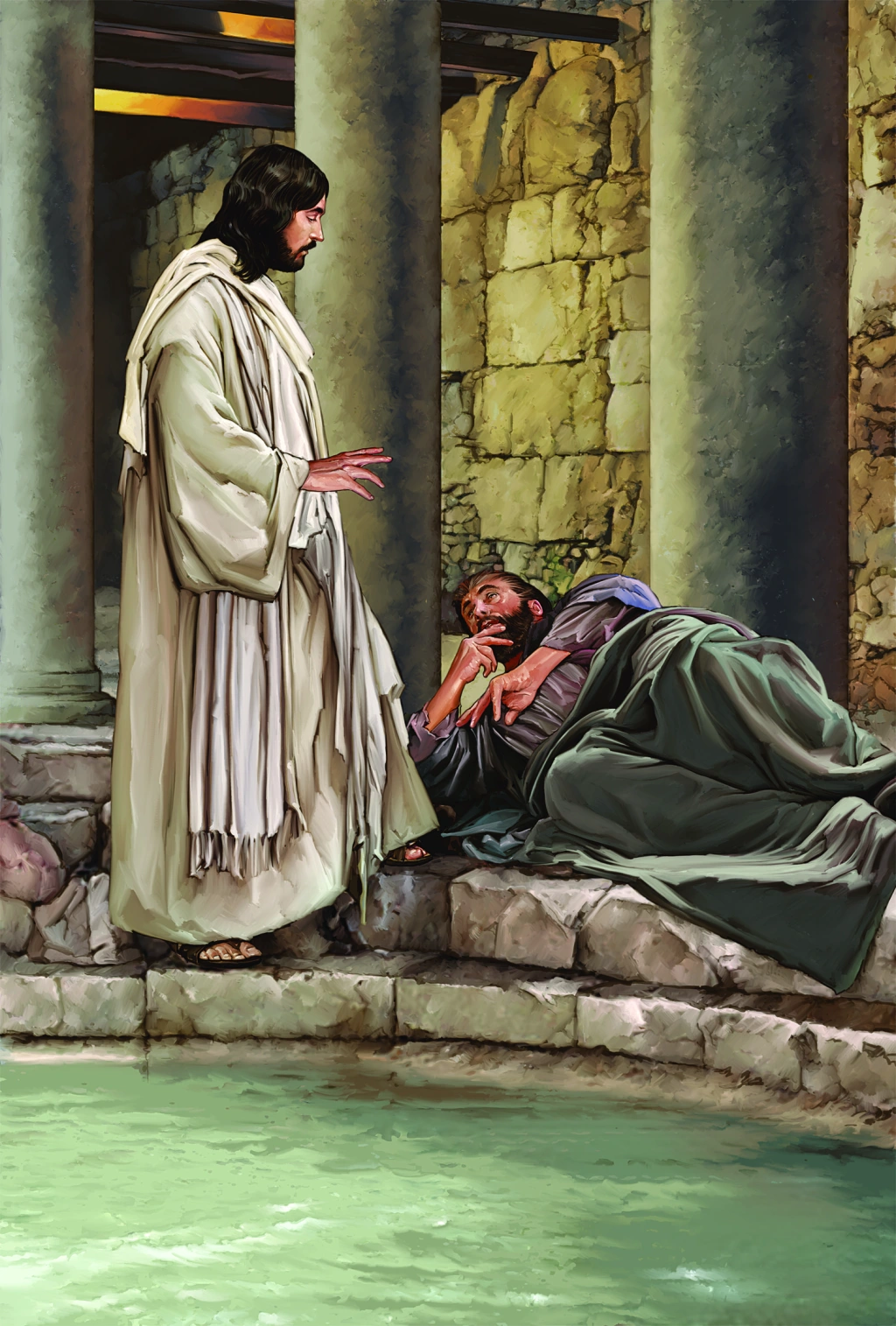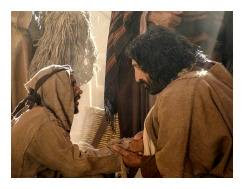 Jews and Gentiles in God’s Plan, Part 1
Jews and Gentiles in God’s Plan, Part 1
Lesson 10 Romans 9:1-33
In romans 9-11 we come to a major shift in Paul’s presentation. The first eight chapters highlighted that all people (both Jews and Gentiles) were sinners (Romans 1:18-3:20), that the only way to be justified was through faith (Romans 3:5), and that all who had been justified would walk in God’s principles (Romans 6:1-8-39).
Paul is now ready for the next stage of his argument, in which he will help the Jews see how they fit into God’s plan. That task will take his readers through some complex arguments in Romans 9:11 that climax in 11:32, which proclaims that God will “have mercy upon all” both Jews and Gentiles. That conclusion is the point of the apostle’s presentation in those three chapters. But those throughout the history of the church who have forgotten that all-important conclusion have used Romans 9-11 to arrive at some very unbiblical conclusion regarding predestination.
The problem of problems undergirding the book of Romans is the relationship between Jews and Gentiles in the plan of salvation. Especially difficult for Jewish believers was the fact that the church in Rome had become largely Gentile, despite the fact that the Jews had been God’s chosen people. That fact raised the question: If the Jews are the “elect,” why are most of them outside the Christian community? What part do they have to play in the plan of salvation?
The Children of Promise and God’s Initiative
Romans 9:1-13
It is this such issues that Paul now turns. But he starts out his three chapters on the topic in a strange way. Three times in Romans 9:1 he emphasizes the truthfulness and sincerity of what follows. The apostle feels that some of his readers will have grave doubts about various points of his presentation. He wants them to know that he is speaking with the utmost heartfelt sincerity.
Romans 9:2, 3 expresses Paul’s deep concern for Israel, since the vast majority of them had not accepted the gospel that he believed provided the only means of salvation. His anguish reaches the point that he claims that he “could wish” that he himself might become a sacrifice for them if that would mean their salvation.
Romans 9:4, 5 find Paul setting forth Israel’s privileged place and special role in salvation history. In the process, he lists eight of the very blessing that should have prepared them to receive Christ:
- Israel received “the sonship.” The Old Testament repeatedly presents Israel as God’s first-born son” (see, e.g.,, Exodus 4:22).
- Israel had “the glory,” a term indicating God’s personal presence with His people.
- Israel had been the recipient of the covenants that God had made through Abraham, Moses, and David. Those covenants become the vehicle through which Israel entered into a singular relationship to God as a people of both unique privilege and special responsibility.
- Israel was the custodian of God’s law
- The Jews had the temple services, which should have helped them see the role of Christ as the sacrificial Lamb of God (Leviticus 17:11; Isaiah 53; John 1:29).
- They also had the promises especially those related to the coming of the Messiah.
- They had the patriarchs. It was through Abraham, Isaac, and Jacob that God’s blessing came to the world.
- The last blessing is that Israelite nations was the channel for the Messiah.
Eight great blessings – yet they did not save the nation. Many individual Jews, of course, had come to Christ but not the bulk of them.
It is of crucial importance to read Romans 9:6-13 in its context. In Romans 8:28-30 Paul sets forth the thesis that God cares for those whom He has called. Romans 8:31-39 continues that thought, emphasizing that nothing can separate God’s children from His love. Then Romans 9:1-5 raises the problem of why so many of the Jewish nation stood outside the Christian faith, in spite of the fact that they had received God’s blessing. And we need to read all of Romans 8:28-9:5 in the context of the first eight chapters of Romans, in which Paul taught the universality of human sin (Romans 1:18-3:20), that people could only be right with God through faith in Christ (Romans 3-5), and that those who had such faith would live in harmony with God’s principles (Romans 6:1-8:27).
Thus it is that the preceding teachings in both Romans 1:16-8:27 and particularly in Romans 8:28-9:5 set Paul up for the issue that he needed to raise in Romans 9:6-13. In reading these verses we need to remember that the problem being addressed is the calling of God and why there were so many Gentiles who had accepted the gospel but so few Jews. It is in that framework that Paul deals with the question of whether “the word of God had failed” (verse 6).
Not so, the apostle asserts. The problem resided in the recipients of the promises. More specifically, not all those who “descended from Israel being to Israel” (verse 6). Thus the problem is not in the promises of God. He was still calling all Israel to true faith. But they had not been responding to the extent they should have. As a result, they were by their own choices placing themselves outside the family.
Romans 9”7-9 continues the idea that not all those descended from Israel actually belong to Israel, by illustrating it from Abraham’s family. Paul writes that not all of Abraham’s children were true descendants of Abraham, in the sense that they were included in the promises. The promise came through Isaac’s line and did not include Ishmael and the sons of Keturah.
The apostle is not declaring that God did not care for an love Abraham’s other children and their descendants but, rather, that God was free to choose Isaac and reject Esau as the line through which He would bless the world by His special revelation through whom He would send the Messiah.
The Lord’s continuing ability to choose those to whom He will give His blessing is crucial to Paul’s presentation, since he has already argued in Romans 3;21-4:25 that individual can only become a part of God’s true covenant people as children of Abraham by faith in Christ. That is exactly where the problem is. Not all who were born into the Jewish nation had selected that faith. Thus were not truly Abraham’s children (cf. Galatians 3:26-29). It was not God’s promises that were at fault but the people (Romans 9:6). God had promised to bless all nations through Abraham (Genesis 22:18), but most of those of Jewish birth had not opted for the faith of Abraham (Romans 4) and, thus, could not be considered his spiritual descendants (Romans 2:28, 29).
But their unfaithfulness had not affected God’s ability to make choices regarding the composition of who would be the bearers of His covenant blessings. Just as at one time He had selected Isaac over Ishmael, so now He could elect those who had the patriarch’s faith. Paul continues the argument in verses 10:13 by his use of the example of God’s choosing Jacob over Esau.
Remember that the topic is God’s sovereign right to pick those who are to bear His covenant blessings. Thus not all Israel belongs to God’s true Israel because they are not opting for God’s choices as set forth in the first eight chapters of Romans.
Some people are taken aback by the idea that God loved Jacob but hated Esau (verse 13). Here we need to remember that the bible does not always use words in the same sense we do. Scripture often employed the word hate to express a preference for one thing or person over another – both of whom one could feel affection for. Thus, Christians are told that they must “hate” their father and mother or spouse if they are to follow Christ (Luke 14:26; cf. Genesis 29L30, 31).
The major conclusion of Romans 9:1-13 is that God’ hasn’t changed. He still operates on the principles He upheld when he selected Jacob to carry the covenant blessing instead of Esau.
The logic of the book of Romans runs that God could also have choose Gentiles to be His people if He so desired. And that is exactly what He had done through Christ. As a result, the problem of a lack of Jewish response was not a failure on the part of God’s promises (verse 6) but rather on the part of the Jewish people who had not responded in the faith of Abraham their father. Thus in effect, Paul is arguing in the flow of the book of Romans that his teaching on justification is not in contradiction of the Old Testament position that marks out the Jews as God’s chosen people. Rather he is saying that the Jews of his day were in error in seeing themselves as the only people acceptable before God, since He always works on the principle of gracious election (verse 6-13).
At this juncture it is important to emphasize the fact that Romans 9 is not discussing our questions about individual free will. The chapter doesn’t even address the issue. Rather it is arguing for God’s absolute freedom to have mercy on whomever He will. It is unfortunate that many people have based so much theology on a topic that chapter 9 does not even broach.




8 responses to “Jews and Gentiles in God’s Plan Part 1”
I am truly sorry I did read it again and I did misunderstand the first time. I love how you write just a little long for me LOL. Forgive me PLEASE! You are correct in all as far as my poor knowledge understand. Thank you for answering me.
Do you know DR Chuck Missler? please check him out on YouTube or khouse.org.
You might find him interesting. He also is a Scholar like you,
God Bless you and sorry!
LikeLike
Hi Pat
Quite all right, glad you enjoyed the post.
Blessings
Pastor Lester
LikeLike
Dear brother, the Jewish people will always be the chosen one, not the Gentiles.
I will try to find a passage that will validate what I am saying. I “know” the Bible in my heart and spirit some and I remember clearly reading about the Chosen one, Israel.
The Church did NOT take the place of the Jewish people.I love your post but if I understood correctly I must disagree there.Your writings are inspiring and you write clearly. English IS my second language.
Thank you,
Pat.
LikeLiked by 1 person
Hi Pat,
Thank you for taking the time to read my post and respond. Sorry for my slow response, but Saturdays are my very busy day of ministry between teaching, preaching at church and also working with inmate in one of our local prisons. I look forward to your sharing the text with me regarding Israel.
Blessings,
Lester Bentley
LikeLiked by 1 person
You are a very good teacher. Thank you. I wish I had mre time to read all you write.
LikeLiked by 1 person
I am a sister
LikeLike
Hi Pat,
Wish we all could think of each other as brothers and sisters.
Blessings,
Pastor Leseter
LikeLiked by 1 person
Amen!
LikeLike